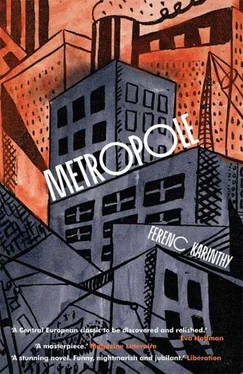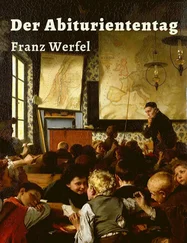But he couldn’t dismiss the thought of it. It continued to worry at him: what if he should miss one vital clue? He had become convinced that if he didn’t do everything he possibly could, if he did not pursue every trail that seemed to hold out the faintest hope of success, if he once relaxed or tired, his instinct would be simply to give up and accept the situation. It would mean that he had lost the battle and was trapped here forever. In the end perhaps it wasn’t so much the cinema and the potential experience it offered that drove him as the desire not to have to reproach himself with anything.
He dedicated a whole day to it, from early morning to late night. First he took the metro to the same terminus as he had last time, then walked on from there exactly as before in exactly the same direction. He passed the long stone wall and the gasometers. There was the factory with the saw-tooth roof, there were the water reservoirs — he never thought he’d take this road again! The white circus tent appeared: it was here he should find the entrance he had taken to be a cinema. Fortunately it was not too far from the station. There was no fog this time which meant no illumination either but he hadn’t forgotten where it was and soon enough he found it on the other side of a busy overcrowded square.
It was, however, not a cinema but a department store, a pretty big department store when it came to it, some eighteen to twenty storeys high with people streaming in and out of its various doors. The range of available goods didn’t seem — not on the ground floor at least — to be any greater than elsewhere: fancy, slightly out-of-fashion clothes, household objects, mass-produced items, modest stuff generally of inferior, market-stall quality, or crudely functional articles sold by the dozen. But he didn’t want to buy anything in any case — what was there to buy? — so he didn’t go in but turned and hurried towards home. There was still the downtown area to explore and with some effort he remembered which metro station he should aim for. Once he had been somewhere he was generally pretty good at finding his way back.
It was a weekday but the streets were almost as crowded as they had been before. As the sky darkened so neon lights began to sparkle and mechanical music to rise from bars and cafés. Drunks were teetering across the pavement, bellowing, blowing paper trumpets. He discovered the narrow side street where he had previously entered one of the houses: the woman with the white tulle, dark lashes and the pearl-bright face was smiling in the window again with a modest Madonna-like gaze. Budai thought a little nostalgically of the days when he had money for such things, to enter such a house, to take a boat out, to have a few drinks and enjoy a pancake.
There was no sign of a cinema but he was glad to pass this way again. He had been so lonely — the longer he spent in the city and the more populated he recognised it to be the more neglected he felt — that the simple fact of returning somewhere he had been before established a kind of relationship, a tenuous foothold in a sea of unknowns. The ferris wheel, the swing-boat, the target-shooting, the Fat Lady. He still couldn’t work out whether there really were no cinemas or if he had somehow missed them. But he did not feel this was so important now, or maybe he just knew a little less than he thought he did.
It was his own fluctuating state of mind that preoccupied him for the time being. Briefly he found himself enjoying the heaving crowd of which he was a part, finding it bearable, quite pleasant in fact. Above all it was a sense of irresponsibility, the one not-entirely-to-be-dismissed pleasure that lightened his mood. It was good not to have anyone else be dependent on him, no one to question what he was doing why. He might eventually get used to the manner of life here, to the eternal waiting, to the queues, to the rough crowd; he might stop noticing it altogether: it might become as natural to him as to everyone else. All this of course was just a passing mood, or possibly the result of a creeping emotional anaesthesia, a brief break from its direct opposite. And somewhere at the core of the tiny spark of happiness there was Epepep too, that tingle of certainty that today or tomorrow he would see her again.
The next moment he was besieged by doubt and bitterness once more. No, no, no — he could never get used to it, however long he remained here, not to the food, the drinks or even the taste of the air, that sooty-sweet, granular concoction that was so heavy and cloying it seemed there was less oxygen in it; nor to the eternal jostling, shoving, elbowing and kicking: the saturation, the whole impatient, mad rhythm of life. Budai preferred sunny, wide-open spaces like Italian piazzas with their fresh breezes. What was he to do in this constantly crowded, apparently endless brick and concrete mass that looked like one enormous suburb? And he missed his wife, his family, his work, his home and the ordered circumstances of his life more each day. Furthermore, he had to fight to dismiss the constant agony of imagining what they might make of his disappearance, his vanishing without trace.
The wildest ideas occurred to him as his mind chugged along on empty, throwing out endless questions with not a single answer. Was it possible, for instance, that his arrival in the city was not the result of a misunderstanding? That it wasn’t that he had blundered onto the wrong flight but that someone had deliberately misdirected him, in other words abducted him? They could have slipped a sleeping draught into his food so he shouldn’t be able to tell how long they had been in the air. Might they be deliberately keeping him here, preventing his return home? But who might they be and why? What possible purpose could it have? And why him? Was he somehow in somebody’s way? What had he done wrong? Whom had he harmed?
That actually would have been his preferred option. Anger, malice, hatred… they cut both ways. Passion can be resisted with passion: one could work oneself up into the appropriate state, search out the enemy, take him on, do battle with him and, in this way, defeat him. If, on the other hand, it was only blank stares and mere indifference that were detaining him — which looked more likely — there was only negative energy to draw on, an immobility that would prevent him attracting anyone’s attention or interest. And how, in that case, was he to extricate himself from this tepid slough of feeling when there was nothing to cling to, no firm ground on which to set his feet?
It was vital not to go mad! He must not to allow himself to be overcome by confusion, by pandemonium, by isolation. Time and again it swept through him, the fear that he would give up the hopeless struggle and sink into the surrounding chaos, or alternatively become indifferent and surrender to melancholy and torpor. He had no weapon but his consciousness: it was the one beam of light he could aim at the waking nightmare.
He considered the cumulative effect of his various meditations and enquiries, weighing up how far he had got with the tools available to him. He recognised a few phrases he had picked up from everyday speech and knew roughly what they meant; he knew the numbers one to ten and how to greet and address someone. Beyond this he knew the approximate meaning of certain groups of written characters and could more or less pronounce them if Deded’s pronunciation was anything to go by. These were chiefly the names of articles for purchase and two or three longer terms. On the other hand, he could only read complete words and had failed every time to break them down into their constituent elements. So far he had had no success at all in assigning any specific sound to any character, nor, conversely, point to characters appropriate to this or that sound or group of sounds: worse still, he had not the least idea what form of writing they employed.
Читать дальше












